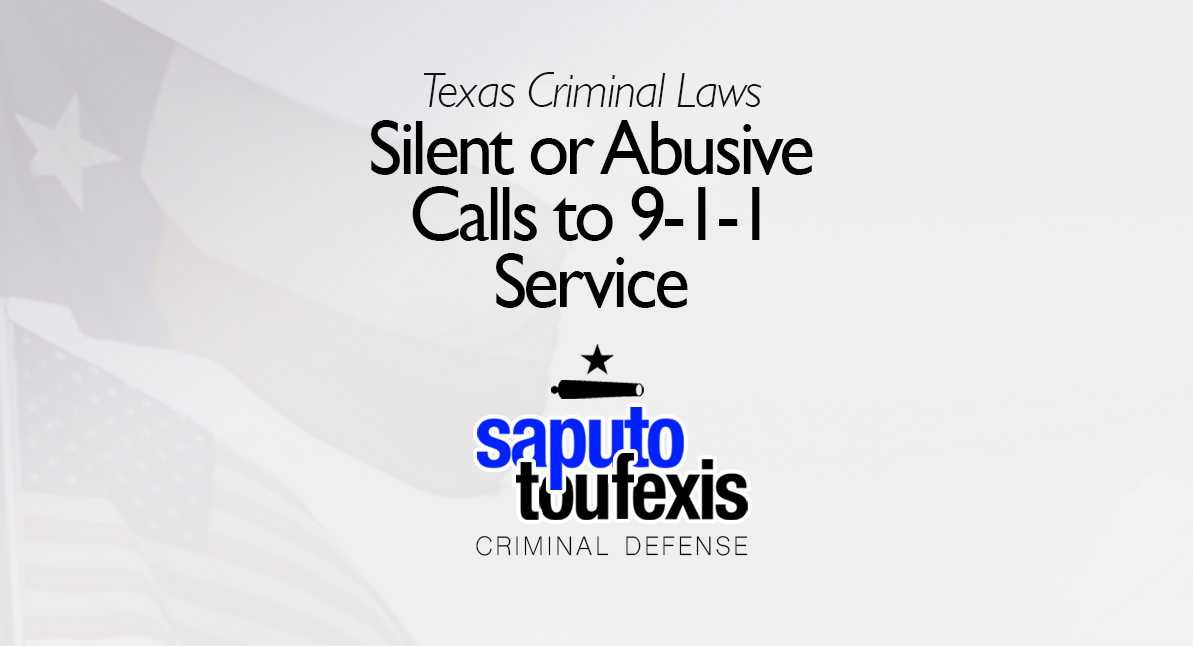The Texas Silent or Abusive Calls to 9-1-1 Service law makes it a crime to call 9-1-1 or allow someone else to use your device to call 9-1-1 and make abusive statements or stay silent when you know there is no real emergency.
FAQs about the
Silent or Abusive Calls to 9-1-1 law in Texas
- What is the current Texas law about Silent or Abusive Calls to 9-1-1 Service?
- How can I be charged with a Silent or Abusive Calls to 9-1-1 offense in Texas?
- What is the statute of limitation for Silent or Abusive Calls to 9-1-1 in Texas?
- What is the penalty for a Texas Silent or Abusive Calls to 9-1-1 offense?
- Can you get probation for Silent or Abusive Calls to 9-1-1 in Texas?
- What level of crime is Silent or Abusive Calls to 9-1-1 in Texas?
The Texas legislature codified this criminal offense in Texas Penal Code Section 42.061. The legislature did not update this law in 2023. In fact, this law has not been amended since 2013.
The Penal Code classifies the Texas Silent or Abusive Calls to 9-1-1 law under Title 9 “Offenses Against Public Order and Decency,” Chapter 42 “Disorderly Conduct and Related Offenses.” Learn more about the Texas offense of Silent or Abusive Calls to 9-1-1 Service below.
What is the current Texas law about Silent or Abusive Calls to 9-1-1 Service?
Texas law currently defines the offense of Silent or Abusive Calls to 9-1-1 Service in Penal Code Section §42.061 as follows:[1]
(b) A person commits an offense if the person makes a call to a 9-1-1 service, or requests 9-1-1 service using an electronic communications device, when there is not an emergency and knowingly or intentionally:
(1) remains silent; or
(2) makes abusive or harassing statements to a PSAP employee.
(c) A person commits an offense if the person knowingly permits an electronic communications device, including a telephone, under the person’s control to be used by another person in a manner described in Subsection (b).
PSAP means “public safety answering point.”[2]
How can I be charged with a Silent or Abusive Calls to 9-1-1 offense in Texas?
You can be charged with Silent or Abusive Calls to 9-1-1 Service in Texas if the state’s attorneys believe that each of the elements of either 42.061(b) or 42.061(c), as described in the section above, have been met.
What is the statute of limitation for Silent or Abusive Calls to 9-1-1 in Texas?
As a misdemeanor, Silent or Abusive Calls to 9-1-1 charges have a two-year limitations period.[3]
What is the penalty for a Texas Silent or Abusive Calls to 9-1-1 offense?
A conviction for Silent or Abusive Calls to 9-1-1 Service in Texas is punished as a Class B misdemeanor,[4] with a maximum possible fine under Texas state law of up to $2,000 and jail time of up to 180 days.
Can you get probation for Silent or Abusive Calls to 9-1-1 in Texas?
The Texas Code of Criminal Procedure allows both judges and juries to grant probation for Silent or Abusive Calls to 9-1-1, and judges are also allowed to accept deferred adjudication plea deals.[5]
Note, however, that judges may not grant community supervision after a conviction if (1) the defendant used or exhibited a deadly weapon during the commission of the felony or immediate flight thereafter and (2) the defendant used or exhibited the deadly weapon himself or was a party to the offense and knew that a deadly weapon would be used or exhibited.[6]
What level of crime is Silent or Abusive Calls to 9-1-1 in Texas?
The Penal Code classifies Silent or Abusive Calls to 9-1-1 as a Class B misdemeanor.
Learn more about the penalty range for this offense in the section above.
Legal References:
^1. Texas Penal Code §42.061. This law is current as of 2024.^2. Texas Penal Code §42.061(1)^3. See Code of Criminal Procedure 12.02(a)^4. Texas Penal Code §42.061(d)^5. See Chapter 42, Texas Code of Criminal Procedure, Art. 42A.054, Art. 42A.056, Art. 42A.102^6. Art. 42A.054(b), Texas Code of Criminal Procedure










